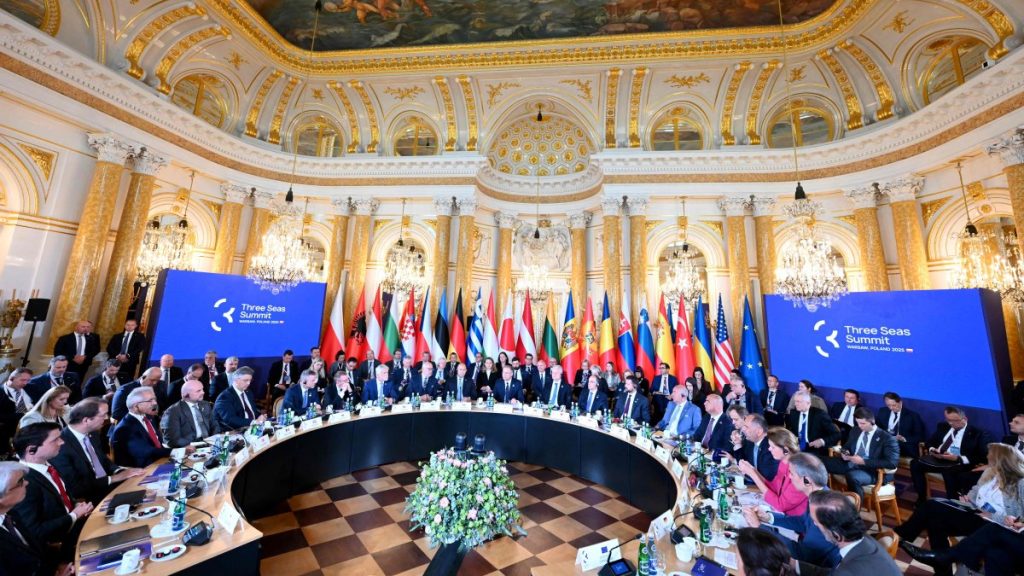It was a cloudy morning in Warsaw. The Royal Castle stood quietly at the edge of the city’s old stone square. Inside, beneath high ceilings and fading portraits, leaders and diplomats gathered for the opening of the Three Seas Initiative’s (3SI) 10th summit. There was no dramatic speech, but Türkiye’s presence said enough.
A few streets away, at the Hilton Warsaw City Hotel, business leaders and policymakers convened for the Three Seas Business Forum. It offered a practical space for regional dialogue on transport, energy and digital infrastructure. The atmosphere was more focused than festive; still, its meaning was unmistakable.
Sometimes, history does not speak loudly. It simply takes its seat.
The 3SI, also known as Trimarium, was launched in 2015 by Poland and Croatia. It brought together 13 EU member states between the Baltic, Adriatic and Black Seas. Its original purpose was to accelerate North-South infrastructure in energy, transport and digital connectivity. Since 2016, the initiative has held annual summits, each accompanied by a business forum where public and private actors coordinate major regional projects.
What began as a regional infrastructure initiative has grown into a geopolitical platform. By promoting strategic autonomy, diversifying energy sources, and enhancing digital resilience, the initiative has become a symbol of alignment, orientation and momentum. Türkiye’s new role is part of that transformation.
From crossroads to coordinator
For centuries, the land between the Balkans and Anatolia served as a passage. Soldiers, traders and messengers moved across it. Türkiye was seen as the place in between. However, in recent years, Türkiye has not only invested in strategic corridors, but it has also shaped their direction. The Southern Gas Corridor, the Middle Corridor rail link, deep-sea ports along the Black Sea and Mediterranean, and the Development Road from the Gulf to Europe are not isolated ventures. They form the backbone of a coordinated regional vision.
Transport and Infrastructure Minister Abdulkadir Uraloğlu attended the Warsaw summit not as an observer, but as a counterpart. Türkiye no longer stands between others; it connects them.
Türkiye was officially accepted as a strategic partner at the very recent Warsaw summit on April 29, 2025. This was not a gesture, but a recognition. It reflected accumulated presence, shared vision and demonstrated value.
Legal meaning of partnership
This new role carries legal and political meaning, even without a formal treaty. The 3SI is a platform rather than an institution. Still, Türkiye’s acceptance required consensus, and consensus brings expectations.
Under international law, especially in light of the Vienna Convention on the Law of Treaties, even informal partnerships generate mutual obligations. Türkiye is now involved in consultations, project planning and strategic discussions. These are not honorary roles; they express shared direction.
From a domestic perspective, the partnership aligns with Türkiye’s broader policy goals. The 2024-2028 Foreign Policy Strategy Document of the Turkish Foreign Ministry supports regional cooperation frameworks. No constitutional or legislative amendment was needed. However, future agreements on infrastructure or investment may involve formal ratification or public funding processes, depending on their content.
Memory built in stone and rails
In the lively days of 1906 Istanbul, ships crossed the Bosporus under the fading sky. At the waterfront, engineers stood watching as Haydarpaşa Station rose from stone and steel. It was not just a terminal. It was the beginning of a route into Anatolia and beyond. That memory endures. Today, the Marmaray Railway Tunnel runs beneath the sea, linking Europe and Asia in both directions.
The Baku-Tbilisi-Kars railway stretches eastward. Fiber lines follow the contours of ancient trade paths. The material has changed. The direction has not.
Projects like Rail Baltica and Via Carpatia are no longer remote prospects: Rail Baltica is the high-speed rail line linking Estonia, Latvia, Lithuania and Poland, uniting the Baltics with the European rail network. Via Carpatia is the transnational highway from Klaipeda on the Baltic Sea to Thessaloniki on the Aegean. It crosses Poland, Slovakia, Hungary, Romania, and Bulgaria before reaching Türkiye.
Türkiye’s ports, highways and digital links already connect to these corridors. Via Carpatia, in particular, is expected to become the spine of north-south movement, reaching from the Baltic coast to Istanbul’s Bosphorus.
For Europe, it deepens connectivity toward the southeast. For Türkiye, it affirms its place as the natural bridge for goods, data and energy flowing between the neighboring Middle East and the continent. And if the Caspian Sea and Gulf routes are added, the initiative’s three seas can gradually expand into “five seas,” joined through routes, law and shared purpose.
Why the 3SI matters
Türkiye had already appeared at the previous summit in Vilnius. Its shift from guest to strategic partner was steady. Türkiye had always been there. What changed was the recognition of its capabilities. With Türkiye’s regional connectivity, economic, digital or political aims can be achieved more effectively.
Some member states remain cautious. That is natural in multilateral settings. Türkiye’s next steps must be careful, grounded in principle and aimed at inclusion rather than influence. Discussions on joint funding frameworks, corridor standards and governance structures are likely to follow. These will define Türkiye’s operational contribution.
Handled wisely, these developments could broaden the initiative beyond its original EU-oriented framework. It may evolve into a more inclusive and pragmatic mechanism. Türkiye will have played a central part in that evolution.
As the summit concluded and the square beside the Royal Castle emptied under a silver sky, something had shifted. Türkiye did not wait at the door; it entered through a corridor it had already helped shape. This was not a guest’s arrival: It was the affirmation of a role earned by geography, by policy, and over time. Türkiye, now at the table, helps shape what comes next.


